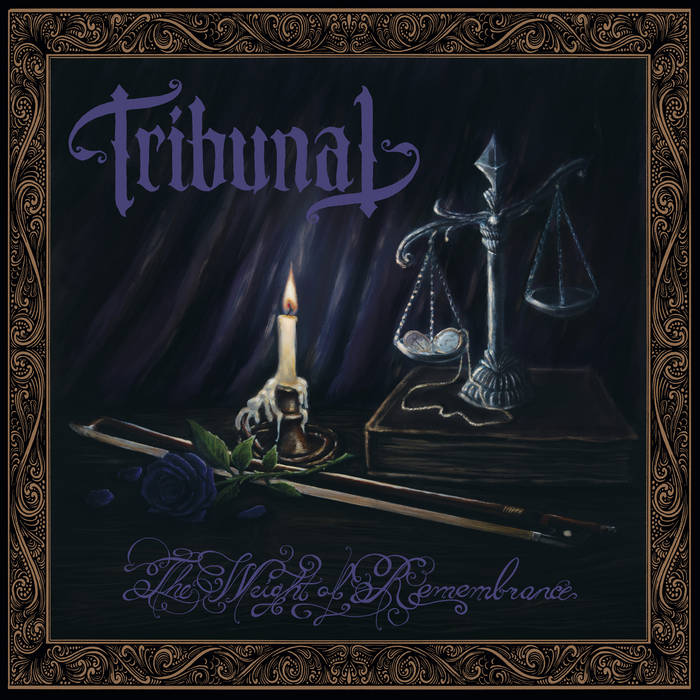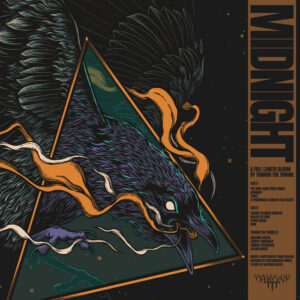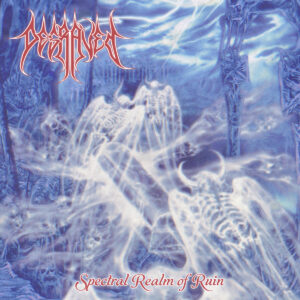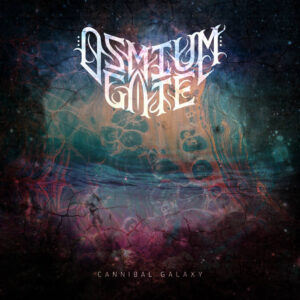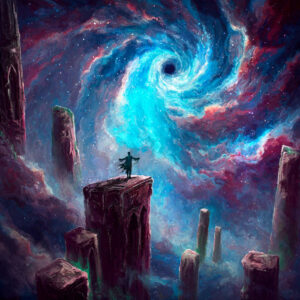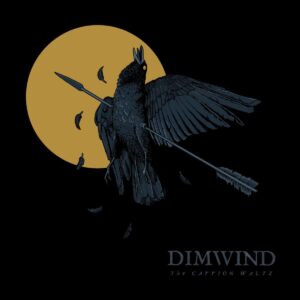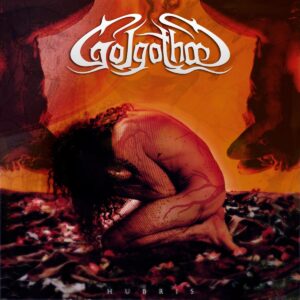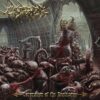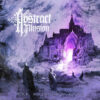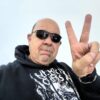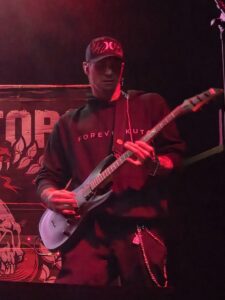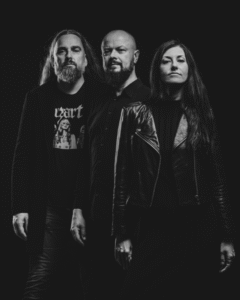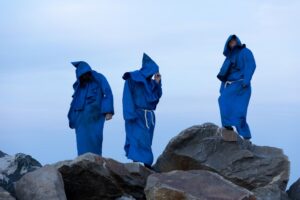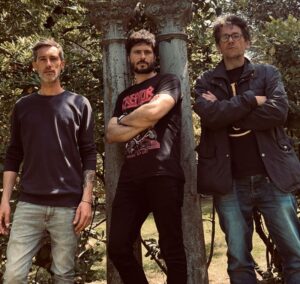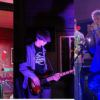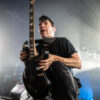Soren Mourne & Etienne Flinn
Tribunal
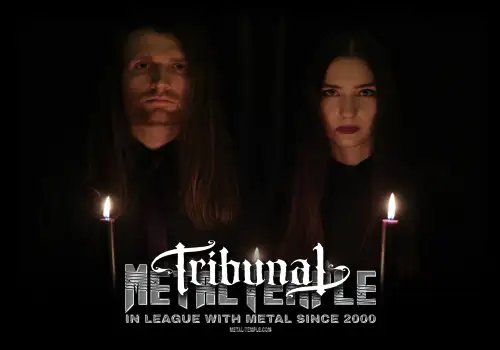
EF: Thank you for having us! We've been doing well, these last few weeks since the album campaign began and especially since the album was released have been incredible. We've really appreciated the positive response from the metal community.
SM: It has been so fulfilling to finally share this record with the world. We have been truly moved by the reception to our work. It has been an amazing time for us as a band.
EF: We connected through our mutual love of metal, and as we both had previously been in bands that had withered without leaving much of a mark, we started to talk about potentially starting a project together. We initially started jamming without much of a goal beyond messing around with some doom riffs, but we loved the music we were producing, and things progressed very naturally from there.
SM: It had been quite some time since I was in a serious project, and I was very ready for a new creative pursuit. My love for doom had grown over the preceding years and I had it in my mind as the next style I wanted to write in, so it was serendipitous to find this overlap in taste with Etienne. We were both going through some similar stages in life, having just moved to a new city, and the lyrical themes drew from our respective experiences.
EF: I've loved music for a long time and was drawn to metal as it had a community full of people who loved music with the same passion that I did. I've played guitar and bass and sang in bands for years, but Tribunal is the first time I've played guitar in a metal band or done harsh vocals.
SM: I grew up in a musical household where I was exposed to a significant amount of classical music, prog, and classic early and proto metal–the voices of Dio, Rob Halford, and Geddy Lee played a prominent part in my upbringing. I have played the cello since I was about 4 years old–my mother is also a cellist–and was always drawn to the more "minor" sounding pieces and the drama of Romantic era works. Given my existing affinity for heavier music, my transition into metal seems inevitable.
I got very into metal around age 13 and shortly thereafter formed my first metal band with my friends on the same path. I started learning bass for the band and my identity as a metal musician became very foundational to my identity during my teenage years. At the time, we were all very obsessed with anything Finnish–Children of Bodom, Ensiferum, and Kalmah were on heavy rotation in the early days. I was always into a bit Black metal than my bandmates and have likely carried that darker edge into my writing over time.
I took a long break from playing in any dedicated projects prior to beginning Tribunal and was interested in pushing myself further as a musician when we started collaborating. This is my first time singing in a band and my first serious effort at composing, both of which have been very fulfilling and challenging pursuits. I have always loved playing live, but the experience of singing and playing music I wrote or substantially contributed to for an audience has been a new thrill.
EF: We were very excited that 20 Buck Spin was interested in working with us for this album release. They are a legendary label who have released many great records, and have been releasing some really exciting doom recently from bands such as Dream Unending, Atramentus, Khemmis, and Worm.
We independently released a pair of singles from this record in the fall of 2021, and while those who listened seemed to enjoy them they did not get much traction in the broader scene. Having the label support the release with their reputation and efforts has made a huge difference in helping the album be heard by so many, and has really shown me the difference a quality record label can make.
SM: Partnering with 20 Buck Spin is an incredible opportunity that we intend to make the most of. As Etienne said, the support of a label with such respect in the scene has been huge in bringing our music to a receptive audience. Many people trust anything 20 Buck Spin puts out to be high quality work, and we are very fortunate to have that impression on our side. We hope to do justice to this well-earned reputation with this album and our future work.
EF: For myself personally, the weight of remembrance is the burden of mistakes regretted, opportunities missed, and warm nostalgia for times that cannot return. We inevitably change with time and not always for the better, and memory lets us imagine different paths we may have taken and how different things could be.
SM: For me, the weight of remembrance is the burden of guilt and uncertainty that comes with feeling you have irretrievably lost something fundamental about yourself or betrayed your values in a way that cannot be corrected. The memory of simpler or more strongly felt convictions and sense of purpose has its own pain, even if you know they are no longer true to you.
SM: There is certainly a significant amount of loss and sorrow on the record, as is typical for this style of doom. However, speaking for my own writing, there is a thread of struggle throughout the lyrics that keeps them from being utterly despairing and hopeless. Initiation depicts being consumed by oppressive forces that threaten your very selfhood, but the narrative voice maintains a critical view of these forces and does not submit to them. Apathy's Keep confronts the sense of failing to aid those facing violence and hardship in favour of hiding away and steeling your heart to their plight. While the protagonist is someone who has succumbed to this escapism, the narrative voice warns that "judgment still comes for the heart of stone," a call to action of sorts. A World Beyond Shadow is about the experience of being lost in the depths of woe and isolation from everything but the untrustworthy shadows of your own mind. The voice shifts back and forth between the fatalistic unseen narrator and the wandering protagonist, who is lost but has not given up on finding another path.
EF: The Weight of Remembrance is an introspective record, with each song reflecting upon a different personal experience. Half the lyrics were written by Soren and half by me, so the record mixes and combines elements of each of our lives, with some of the experiences being shared and others not.
EF: I hope that the listener enjoys the record in whatever way suits them. The album is a work that is intended to be taken in different ways and enjoyed on different levels. There is a sense of theatrical fun to the album's gothic atmosphere that some will enjoy, but a genuine misery in the album's stories and spirit that others can commiserate with.
SM: Thank you very much. I drew on motifs common to vanitas paintings, which often feature elements that represent death, as you noted, while also including elements that reflect the earthly pleasures of life, such as art and music. These features tied into the album's focus on the passage of time in both its beauty and sadness. Specific features, such as the bow and the scales, are more particular to Tribunal; the bow of course foreshadows the use of cello and the scales symbolize the themes of justice we engage with lyrically. We have always aimed for a somewhat timeless aesthetic with Tribunal, or at least one that is not firmly rooted in either the modern era. The classical look of a still life lent itself to this and the vanitas style in particular evokes a solemn, reflective mood, which I believe our album does as well.
EF: I would frame Tribunal's sound as the intersection between Soren and my tastes and abilities. Soren loves epic, traditional, and occult doom from bands like Candlemass and Abysmal Grief, while I tend towards the gothic death-doom that descends from the Peaceville trio. Tribunal's sound mixes these influences, including both the heftier riffs and powerful cleans from more traditional doom and the darker atmospheres and romantic instrumentation of gothic metal. The use of the cello was only natural given Soren's abilities and our sound.
SM: We always hope for our work to be diverse but cohesive, so I am glad to hear you had that impression. The songs illustrate the development of our sound and identity as a band, and you can hear the exploration of different "paths" as you said with each track. For example, the central riffs I brought to Initiation, the first track we worked on, drew largely from the haunted world of Italian doom (for example, Abysmal Grief's Misfortune). By the time I wrote Apathy's Keep, I was becoming more settled in my role as a vocalist and was interested in creating a more powerful, belting chorus that channelled more Messiah Marcolin than Jex Thoth. Women who sing in a smoky lower register, such as in Jex Thoth and the classic Coven, were very inspiring to me to begin singing in a metal context. There are quite a number of women singing in this style in the world of occult rock and doom, which I enjoy but is not really what we are writing for Tribunal. Early on, I was imitating this style more vocally, but towards the end of the writing of the record, I began to find my own sound that blended these influences with our more gothic doom sound.
EF: Initiation and Without Answer were the first two songs written for the album, and they came together collaboratively with the two of us sharing riffs in a room together. I wrote Of Creeping Moss… and The Path more separately, bringing the songs into the band in a relatively complete form, while Soren similarly wrote Apathy's Keep and A World Beyond Shadow with only a few small touches from me.
We put a lot of effort into reworking the tracks on the album into the best possible form. The third movement of The Path was substantially reworked with Soren. The initial section was more major key and triumphant, but we reworked it together to introduce more doomy riffing and harsh vocals to make it fit better into our sound. I also discarded almost all of the lyrics and vocal melodies for Without Answer shortly before recording began in order to re-write it with a clearer theme and direction.
SM: My background as a cellist draws me to certain harmonies and phrasing that feel distinctly classical to me. However, much of metal arising from the lineage of Ritchie Blackmore and Dio is very classically influenced, so these elements don't always stand out as unique. I make use of some devices that may be more familiar to classical musicians, like the counterpoint in Remembrance, but I don't use any advanced classical composition techniques (at least not yet). My love of Romantic era work certainly influences the drama and intensity I aim to bring to my work, and my years of cello have biased me heavily towards lower registers, which is fitting for doom. However, most of the songs on this album were not written with cello in mind, so the classical side of our sound is not as pronounced as it could be. I am exploring this more intentionally in the writing of our next record.
EF: We usually tend to compose the music first and then write the lyrics to the music, though I often have an image in mind of what lyrical themes I intend to invoke while writing the music.
SM: Speaking for myself,
I tried to not overthink the lyrics on this record. Often songs begin for me with a vocal refrain that gets stuck in my head for months until I develop it further and the lyrics that come along with this refrain don't always have a clear direction. For example, the phrase "I have seen, but I've never known" was the lyrical phrase that gave rise to A World Beyond Shadow. I didn't have a clear picture of what it meant at the time, but I built the song around it and eventually it took shape as something that depicted the images and feelings that came to mind while writing the music. This record is quite expressive and introspective, so it felt natural to avoid over-planning our lyrics.
EF: I agree that much like the music itself, the production feels influenced by history but creates a distinct sound. Markov did a great job of evoking a grim and cavernous atmosphere with their production, really bringing the listener into the world created by the album.
SM: I didn't want our record to sound overly clean and hyper-compressed, so I was glad to get a sound that hearkened to the grit of analogue days. Markov created a more expansive soundscape than we initially had in mind, for instance by adding ambience into the breaks between songs and overlaying echoes of tracks in unexpected places. I love albums that create an immersive experience, and I think the sound on The Weight of Remembrance does that well.
EF: In some ways this song feels like the furthest from the core of the record's sound, with more distinct funeral doom and death-doom influence than the rest of the album. Much of the track is heavy and spacious, reliant on a simple set of chord changes, but it includes both one of the album's most melodic choruses and one of my favorite riffs in the midsection. I've been pleased to see many people online connect with this song as a favorite.
EF: I wanted to try writing something longer and more expansive than I'd done before, and I had the initial set of melodies for the intro sketched out on guitar. I wrote the skeleton of the track linearly in a single session, one section at a time. I was keen to ensure the track justified its length and remained engaging throughout, while still feeling like a cohesive whole.
It has four movements in different keys, each with its own distinct feeling. The first movement is slow, spacious, and melodic, inspired by the guitar interplay from Katatonia's "Brave Murder Day" record, though I'm not sure if the influence comes across clearly. The second movement is heavier and more immediate, a self-referential section inspired by Soren's riffs in songs like Initiation and Apathy's Keep. The third movement is more open and triumphant, with some of the most melodic and major-key sections on the record, and the final section returns to some of the musical ideas from the first section with more speed and aggression before fading to a soft close.
Lyrically, the song tracks the journey away from home and the challenges it brings, with the ultimate realization that both time and distance will change you and others and there's no way back to the place you used to live or the person you used to be. It functions well as the closer, touching on all of the musical elements of the record and finishing the album with a gentle fade.
EF: We would absolutely love to perform live outside of Canada, and playing live in Europe would be a dream. We do not currently have plans to do so and both money and schedules would make it a challenge, but if we receive an offer to play internationally, we would do what we could to make it happen.
SM: I lived in Denmark for a short time and was blown away by the variety and frequency of shows and festivals across Europe, in addition to how well-attended they are. I love going to small to mid-size festivals where you have the chance to build community with both audience members and bands. Some highlights for me along these lines are Killtown Deathfest and Prophecy Fest. I have only experienced a sliver of what the international metal scene has to offer and would be thrilled to get to know new audiences abroad.
EF: Thank you for time!

More results...
